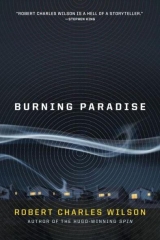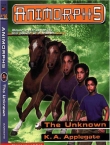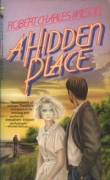
Текст книги "Burning Paradise"
Автор книги: Robert Charles Wilson
сообщить о нарушении
Текущая страница: 11 (всего у книги 20 страниц)
“I don’t know. Maybe it isn’t practical, or maybe they don’t care…”
“Or maybe the predator, having devoured its victim, leaves only a corpse behind.”
The bar was aggressively air-conditioned. Nerissa shivered.
Amélie nodded. “You understand, I think. And this is what has destroyed the plea sure I once took in looking through the telescope. All those wonderful possibilities. But now when I see the stars I think, death. Killing. Nature, red in the tooth…”
“Red,” Nerissa corrected her, “in tooth and claw.” Amélie was quoting Tennyson, whether she knew it or not. A passage about “man,” that Victorian abstraction, Who trusted God was love indeed / And love Creation’s final law—/ Tho’ Nature, red in tooth and claw / With ravine, shriek’d against his creed…
“‘In tooth and claw.’ Exactly.”
“And you blame Beck for changing the way you look at the sky?”
“Blame Beck? No, not for that.” Amélie smiled bitterly. “No. I blame Mr. Beck for propositioning me very crudely when we were alone in his room, and then belittling my work because I refused his advances. But that’s the kind of man he is.” She stood up suddenly, her chair teetering behind her. “I think Mr. Beck is as deluded as the rest of us. He simply cherishes a more militant delusion. Watch out for your husband, Nerissa. I mean to say, be careful of him. Protect him. Because he seems terribly impressed with Mr. Beck’s ideas. And I think Mr. Beck’s ideas are frankly dangerous.”
Nerissa saw Werner Beck once more that weekend, at a group dinner at the end of the conference. All technical discussion was banned for the duration of the meal. It was meant to be a social evening, though Nerissa was the only woman at the table: Amélie Fourier had booked an early flight to Louis Blériot Airport in Paris.
Conversation was shallow and often awkward. Maybe it hadn’t been a good idea to ban discussion of the single subject these people had in common. What was left? Books, films, politics, trivia. Nerissa said little and allowed her attention to drift, but she was impressed by Beck’s obvious domination of the event. The Correspondence Society was supposedly nonhierarchical and Beck held no official position, but it was Beck who called for menus, Beck who refereed minor disagreements, Beck who had organized the dinner in the first place.
And it was Beck who declared it over as soon as the dessert dishes had been cleared away. He held his hand out to Nerissa as she left with Ethan. “Plea sure meeting you, Mrs. Iverson.” His handshake was firm and his smile radiated a perfect confidence. She managed a smile in return, perhaps not very persuasively.
Later, in their room, she told Ethan what Amélie had said about Beck.
Ethan frowned. “It must be some kind of misunderstanding.”
“Amélie seemed clear on what happened.”
“Her work on microwave echoing was pretty thin gruel. Beck was a little dismissive of it in discussion, but I don’t think he said anything unfair. It was Beck who delivered the bombshell at this conference. He managed to detect signaling mechanisms in chondritic cells in culture.”
“And that’s important?”
“Like pulling down a piece of the sky and putting it under a microscope. If we understand how these cells communicate, it should be possible to monitor that communication or even interfere with it. I mean, if we choose to.”
“And the fact that he propositioned her?”
“Well, did he? He may have said something callous, which she amplified out of, you know, professional jealousy—”
“So she was lying?”
“Come on, Ris! Not necessarily lying, but…” He shrugged impatiently. “And no real harm was done. I don’t know why we’re even discussing this. She produced some trivial work, it got the attention it deserved, and she resented it. Maybe Beck didn’t conduct himself like a perfect gentleman, but even if that’s the case, does it really matter?”
At least take it into consideration, Nerissa thought. Don’t dismiss it out of loyalty to Beck. Don’t make excuses for him just because his research is impressive. But she didn’t say any of those things, only frowned and turned away.
The disagreement cast a shadow over their vacation. Oahu was predictably beautiful. They hiked Mokuleia, they sunned for blissful hours on the white sand of the hotel’s beach. But Nerissa had seen a side of Ethan (and of the Correspondence Society) she didn’t like and couldn’t altogether dismiss. And although the stars over the North Shore were lovely, she was haunted by what Amélie had said. Nature, red in tooth and claw / With ravine, shriek’d against his creed… And against Amélie herself, apparently. Amélie had been one of the first to die in the murders of 2007.
“Ris, wake up.”
For a moment she thought she was back in Hawaii. But no. She had slept in the car. She blinked her eyes against a gray dawn, hardly tropical. When she sat up, every joint in her body voiced a separate complaint.
Ethan had parked in front of a bungalow on some dusty street near a railroad crossing. She began to ask where they were, then realized she didn’t have to. This was one of Werner Beck’s many so-called safe houses, the address of which he had given Ethan in the letter that had arrived the day they left the farm house. Evidence of heightened radiosphere activity, Beck had written, take all precautions, you can reach me at this address.
And the man just now stepping out the door and down the porch steps was Werner Beck himself. He hadn’t changed much in the years since Nerissa had last seen him. His posture remained militarily erect, though his hair and beard were grayer. He wore loose khakis and an untucked red flannel shirt. And he was cradling a shotgun, though he offered a tight smile when Ethan rolled down the window.
Please let them be here, Nerissa thought. Please let them be inside the house, Cassie and Thomas, and Beck’s son, Leo. Let them be watching from a window. Let them come running out when they see me. She opened the car door. She stood up. Ethan did the same.
“You’d better get inside,” Werner said.
And from the house there was nothing. Only a pale light, an empty porch, a motionless door, the vacant silence.
17
 DOWD’S GARAGE
DOWD’S GARAGE
EUGENE DOWD’S SPRAY PAINT HAD TURNED the car Leo had stolen from white to metallic blue. With its windows and trim still masked it looked almost fake to Cassie’s eyes, a trompe l’oeil automobile, a magic trick at the point of unveiling. Dowd said he would give it a buff and a clear coat in the morning—there wasn’t time for anything better, and the only purpose of all this work was to make sure the car no longer fit its original description. A hasty coat of paint and new plates was the best he could do. Then they would have to get on the road.
Of course Cassie wanted him to finish his story about Chile, about the desert called the Atacama and the strange lights he had seen there. But Dowd wasn’t in the mood. Tomorrow, he said. He talked better when he had something to do with his hands. In the meantime he meant to drive his truck into Salina to pick up supplies, and did anybody want to come with him?
Beth volunteered at once. Dowd nodded and escorted her out of the garage.
Cassie, Leo and Thomas adjourned to Dowd’s office upstairs, where the grimy window was orange with the glow of the sunset. They were too hungry to wait for Dowd and Beth to get back, so they assembled dinner out of the leftovers in Dowd’s refrigerator. Leo switched on Dowd’s little transistor radio and let it play for a while—mostly Christmas music, since that was the next big holiday on the calendar. The tinkling bells and choral arrangements were cheerful for a time, but after dark the music began to seem as sad and distant as a signal from a ship at sea. Cassie wondered whether she would ever celebrate Christmas again. Aunt Ris had not been particularly religious, but every December she dragged a dwarfish pine tree up the stairs to the apartment and installed it in a tin basin over a white sheet, where its fallen needles would collect in prickly drifts. Cassie supposed the apartment was empty now—past-due notices in the overflowing mailbox, food rotting in the refrigerator, dust sifting out of the still air.
Leo switched off the radio. Thomas sat glumly at the window. “Wish I had something to read,” he said.
Cassie agreed. Even a magazine would have been better than nothing, but a search of Dowd’s premises had proved fruitlesss. “All we have,” she said, “is one of Uncle Ethan’s books, and Leo’s got dibs on that.”
“I could read it out loud,” he said.
Cassie had to stifle a laugh when she realized he was serious. It seemed comical to her, the idea of chain-smoking Leo Beck reading to them from a work of popular science. But it was a nice thought. (And, come to that, when was the last time she’d seen him smoking a cigarette? He must have finished his last pack, and he hadn’t asked Beth to pick up more.)
Thomas seemed intrigued. “Really?”
“Yeah,” Leo said. “Sure.” He flashed Thomas a smile, then opened the book to its first chapter. “Consider a fisherman—let’s say, a young man who owns his own boat and weaves his own nets….”
In Leo’s sonorous and surprisingly confident voice it sounded more like a story than an essay. Cassie watched Leo’s face as he read, the attention he paid to the text, the way he glanced up from the page to make eye contact with Thomas, who leaned forward with obvious interest. It was a charitable act, she thought. A nice thing to do. Apparently, somewhere inside Leo Beck was a man Cassie might be able to respect.
Dowd and Beth returned after midnight, both of them a little drunk. Dowd left a box of canned goods by the door and brought a few perishables up to the refrigerator in his office. “Supplies for the trip,” he said, and stalked out again before Cassie could ask the obvious question: What trip? Where are we going?
Leo and Thomas and Cassie had already unrolled their sleeping bags on the floor of the office. “You’re closest to the switch,” Leo said. “Will you turn out the light?”
“Okay, but what if Beth comes in later?”
“She can find her way around.”
From downstairs, the sound of hectic laughter.
–
A few miles down that road—and it wasn’t much of a road, just gravel and dirt blown over with sand—me and Bastián realized we were doing something stupid.
Morning had dawned cold, with a few flakes of snow drifting from a thickly overcast sky. The air in the garage smelled of urethane and stale beer and motor oil. Dowd had stripped the car of its masking and now he had it up on a lift, inspecting the tires and undercarriage in case it became necessary to drive through bad weather. On their way to where, exactly, Dowd still hadn’t said.
Stupid because we didn’t know what we were getting into, and stupid because we’d almost for sure be fired. But it didn’t matter. It was one of those situations where you just say fuck it. Fuck the job, fuck management. The pay was decent but living in a bunk house the middle of the world’s driest desert, staring at the salares and the cordillera all day, makes you a certain kind of crazy. I don’t know about Bastián, but I was ready to go back where people actually lived. See something vertical for a change. Talk to a woman who wasn’t an overseer or a forklift driver.
So we drove on even after the Pisco ran out. Bastián started talking about copper mining. He said he had a cousin who had worked at Chuquicamata and Escondida. What ever these people were doing out here, he said, they weren’t mining copper. To mine copper you need water, but there was no river or aquifer. Big tanks of water had come through our compound, but not enough for serious ore extraction. And if they were doing heap-leaching there would have been bulk shipments of sulfuric acid and chemicals like that. Hell, we should have seen the tailing dams by now. Or at least smelled them. Because we were getting close.
What we did see was all kinds of garbage on the side of the road. That’s the thing about the desert, nothing rots or gets overgrown or sinks into the earth. You throw something away, it just sits there. We drove past these little piles of fractured aluminum tubing and cut metal and broken machine parts and colored glass and cracked ceramic insulators and shit like that. It was past midnight, there was a half-moon in the sky and all kinds of stars, so it looked pretty strange, sort of Martian, if you know what I mean—these trash piles with rebar and steel girders sticking out. Six feet high, some of them, then ten feet high, until we were driving down an alley made of trash, and Bastián slowed up and started to look worried. Eugene, he says, this is not a normal operation. No shit, I said.
I don’t want to be seen here, he says. What ever these people are doing, they don’t want company. Well, I say, and it was probably the Pisco talking, I came out here to see and I mean to see.
Okay, but on foot, Bastián says. Toyota makes too much noise.
Okay. So we get out and climb up an embankment that’s mostly industrial refuse. Slipping on sheet plastic and grabbing rebar like it was tree branches, all in all probably making more noise than we would have if we just kept driving. But it turns out Bastián picked a good place to stop, because from the top of that ridge we could see the whole installation.
If you want to call it that. The compound. What ever. That’s no mine, Bastián says. Yeah, I said, that’s pretty fuckin’ obvious.
It was a patch of desert the size of a small town, with this trash heap around it like the side of a bowl. Most of the buildings in it were long sheds, tin roofs, plywood or cinderblock walls, no marks on them. In the middle there was a tower, not very tall and kind of squat, holding up what looked like a ten or twelve big mirrors arranged like the petals of a flower. You could tell they were mirrors because they reflected the lights from the buildings and also the stars overhead. Real industrial-looking. Around it there was a bunch of pumps and pressure tanks full of god-knows-what and fat electrical cables, all told taking up about as much space as a regulation football field. That was where the light came from, the light we saw all the way back at the depot where we worked.
“How do you know that’s where it came from?” Thomas suddenly asked. Dowd gave him a shut-the-fuck-up look and paused. Cassie put a protective arm around her little brother.
We knew because it came on while we were watching. Nearly blew us back down the trash heap. I mean it wasn’t loud or anything, there wasn’t any noise at all except what might have been a compressor buried somewhere underground. But bright, oh, Jesus! Maybe thirty seconds before I could see anything but the glare. Bastián put his head down, but I couldn’t help sneaking looks. The beam of light went straight up, and it didn’t spread out like a spotlight, it was straight as a pencil all the way up to where it disappeared. The air started to smell electric, like hot metal and burning insulation.
Bastián said in a sick little voice he wanted to get back in the Toyota and go home. And I thought that was a good idea. Because with all that light we were pretty conspicuous, and worse… I could see things moving. Moving toward us. Look, I said.
People down there, he says. Anyway we guessed they were people. Between the glare and the shadows it was hard to tell. The way they moved, they might have been animals. Big ones. So. Come on, he says, let’s get the fuck out of here. So we scramble down the dark side of the trash heap, half-blind, tripping over shit. I cut myself on a piece of sheet metal and didn’t even feel it till later. Still got the scar—see?
Dowd lifted his T-shirt to expose his torso. The scar ran at right angles to the staves of his ribs, a pale irregular line.
Then Bastián says stop, I hear something. So we stand still. The wind had come up, so I could hear scraps of roofing paper and torn plastic rattling in the trash pile, plus industrial sounds from the compound, that compressor or what ever it was beating like a drum, and over that—this is what Bastián was talking about—a kind of scrabbling sound, like a dog might make digging through garbage. Getting louder. Bastián looks up at the ridgeline of the trash heap and kind of gasps, and I look where he’s looking, and there’s this, uh, thing up there—
“What do you mean?” Leo asked. “What kind of thing?”
Dowd gazed abstractedly at a torque wrench he had picked up.
Well, that’s a good question. I don’t know what else to call it. It was something about halfway between an ape, a spider, and a Swiss army knife.
Thomas emitted a bark of laughter, more nerves than anything else. Dowd ignored him.
Moved like a spider or a crab. Had about that many legs. But it bent up at the middle, I mean it had a kind of a waist, and arms above that, but not hands—more like tools, blades and pincers and shit like that. And it had a head, which was the only human thing about it. Not a human head exactly. But eyes, a mouth.
So it comes down the side of that trash pile, headed straight for Bastián. Bastián starts looking around for something he can use to defend himself. Grabs a piece of rebar that’s sticking up but it’s buried too deep, he’s like desperately tugging on this iron rod, doesn’t take his hand off it until the thing is on top of him. Then he tries to back up but he’s on a slope and he can’t move fast enough and the thing just—well, it basically took him apart. Three quick moves. Snip snip snip. Three pieces of Bastián rolled past me, leaving blood trails.
Then it came for me, but I’d had a little more time get ready. Or else I just got lucky—the Lucite rod I grabbed out of the trash had about the weight and heft of a baseball bat. The thing had long arms and those fingers, or blades, or claws, were fast as lightning, I got a couple more scars I could show you but I’d have to drop my pants—anyway I managed to bring that rod down on the thing’s head, maybe not hard enough to kill it, I don’t know, but maybe I did, it dropped like all its strings had been cut and I proceeded to move the fuck elsewhere.
Got to the Toyota. Did a crazed U-turn and as soon as I’m pointed the right direction I see a half-dozen more of those things in the mirror, gaining on me. Stepped on the gas so hard I nearly ran the fucking vehicle off the fucking road. Kicked up a big cloud of dust and sand, which in the glare of that light was like a smokescreen.
The next thing I see is in front of me, and this time at least it’s a human being, a guy in jeans and a white shirt standing in the middle of the road trying to flag me down. Which was almost reassuring, except the guy has a pistol in a holster and he’s starting to reach for it. I mean, to me he looked like a mall cop. But what am I gonna do, pull over? So I stand on the gas pedal.
The guy looked weirdly calm, and I could see him real clear in that freaky light, trying to level his pistol before the Toyota hit him. Like it was a race between the pistol and the Toyota. The Toyota won. I hit him full-on.
Which pretty near killed me. Any of you ever been in a car when it runs into a large animal, maybe a deer? No air bags on that vehicle. No seat belts. If my legs hadn’t caught on the steering wheel my head would have gone through the windshield. As it was I took a nasty crack on the dashboard. Lost control. The vehicle went up on two wheels, almost turned over. It was halfway up the embankment before I got control of it again. Big dent in the front end and the engine making a sound like a circular saw with a bent blade.
But the mall guard was dead. I knew that because he was all over the fucking windshield. He pretty much exploded on contact. Green shit everywhere. I mean I had to turn on the wipers just so I could see. Clots of red and yellow, yeah, like blood and I guess body fat, but mostly green—I guess you know what I’m talking about.
“He was a simulacrum,” Thomas piped up, needlessly.
Yeah, a sim. But obviously I didn’t know that then. It was just more weirdness. I was being chased by spiders with blades for hands, Bastián was dead, the mall guard was made of snot, and all I wanted was to be anywhere else in the world but this fucking desert. Kept my foot on the gas even when smoke started coming out from under the hood. Long as the wheels turned. One eye on the mirror at all times.
Pretty soon they switched off that tall beam of light. And I killed the Toyota’s lights and drove by the moon, just to be less conspicuous. I expected to be chased, but that didn’t happen. At least not right away. And then I thought, well, where do I go? Back to the depot? Tell an overseer I totaled a company vehicle and by the way Bastián was cut in three pieces by a giant crab?
Since there was nobody on the road back of me far as I could see—and in the Atacama that’s a long way, even at night—I stopped the vehicle and tried to take inventory and come up with some kind of plan. Took off my shirt and tied it around my ribs to stop the bleeding. Obviously the Toyota wasn’t going to make it much farther. Smoke kept coming even when I turned the engine off. I got out and opened the trunk. Found a spare tire—useless—a tire iron, the four-way kind—also pretty useless—and a jack. The jack had a detachable steel handle, which was better than nothing, so I took that. A knife would have been better. Even a box cutter. Anything. But the jack handle was the best I could do.
Then I rolled the Toyota off the road and pointed it across the salt flats, got the engine running—barely—put the transmission in neutral, braced the tire iron against the gas pedal, put it in first gear and jumped the fuck out. The vehicle rolled out into desert on a slow curve, probably would have come right back to me except the engine died when it was a couple of hundred yards off in the flats. Engine caught fire. Pretty soon it looked like a bonfire, burning out there. I hoped it looked like I’d driven off-road and maybe died in the fire. Or at least that somebody might think that from a distance. Then I hunkered down behind the little dirt-and-pebble embankment at the side of the road, which was the only thing to hide behind, which wasn’t much.
Still trying to make a plan. The moon was close to setting and dawn was about an hour away. If more mall guards showed up I thought I might have a chance, but if a posse of those spidery things came down the road I figured I’d be better off slitting my own throat before they did me the favor… But then I saw headlights in the distance.
It was just one truck. A four-wheel-drive Ford with roll bars and a pickup bed. It slowed down, probably because the driver saw the Toyota burning like a motherfucker out there on the salt flats. Stopped a few yards away from where I was hiding. Looked like there was two guys inside. One of ’em gets out. He’s a mall guard—same clothes, same pistol on his hip. Flashlight in his right hand. He’s looking down at the road, shining that light on the gravel, checking out the tire tracks where the Toyota veered into the salare. And every step brings him a little closer to me.
So while he’s staring at the ground I get up and run at him. All I have on my side is surprise. He sees me coming, of course. He drops the flashlight. Reaches for his pistol. But I swing the jack handle before he even touches the weapon. He dodges real quick, but I manage to stun him. So I hit him again, a home-run swing to the side of his head, which drops him like a bag of sand. I go down on my knees and take the pistol out of his holster.
In those days I didn’t know a lot about firearms, but I’d handled my daddy’s old .45 a few times. So I switch off the safety and pray the fucking thing’s loaded, because the second guy is getting out of the Ford in a hurry, and he’s definitely armed and dangerous. I get off one shot, which goes through the Ford’s windshield. Useless. Second shot clips the guy’s shoulder, which turns him around. I’m up and running, he’s still trying to bring his weapon up though his arm don’t work right, third shot is to the head and boom, he’s down.
Another head shot for each mall guard, just to make sure. Which causes blood and green goo to leak all over my shoes.
Then I get in their truck and drive. Full tank, reliable vehicle, and by this time I’m so high on adrenaline I start to feel pretty good about myself, all things considered. Back of me I can see more headlights, but I’m way ahead of ’em. I blow past the depot where Bastián and I worked, and by the time the sky gets light I’m halfway to San Pedro de Atacama and if anybody’s following they’re well out of sight.
In San Pedro I traded the Ford to a guy no-questions-asked for his little piece-of-shit ten-year-old Hudson, which for some reason there are a lot of in the Atacama, somebody must’ve opened a dealership once… a plain dumb car, which I managed to drive all the way to Antofagasta before its tranny seized up. Laid low for a while, did day labor at the puerto until I could afford a plane ride back to the USA. Back home I spent a year or so trying to chase all this shit out of my head with Jack and Coke, hold the Coke, until I shot off my drunken mouth to that writer. After which Werner Beck showed up and more or less explained things to me.
And that’s my story.
“But that doesn’t explain anything,” Leo protested.
“What do you need explained?”
“The light in the desert? The spider things?”
“You should ask your daddy about all that, Leo. Assuming you ever see him again.”
“Also, what’s in the back of your van that’s so important?”
“Your daddy should’ve mentioned that, too.” Dowd grinned, displaying a row of crooked teeth. “You could call it a secret weapon. Or part of one.”
“And you keep talking about getting on the road. Road to where?”
“Do you really have to ask?”
Leo shook his head. “This is crazy.”
Dowd’s grin expanded. “Amen, brother,” he said. “No argument from me.”








